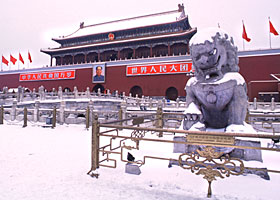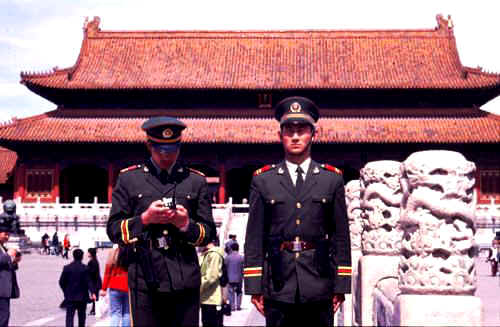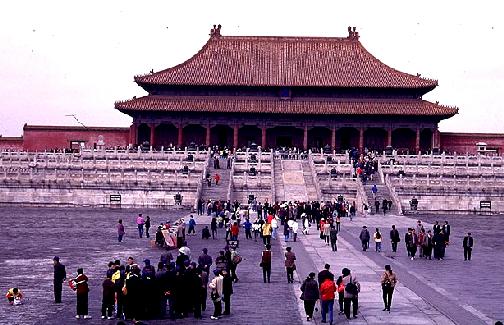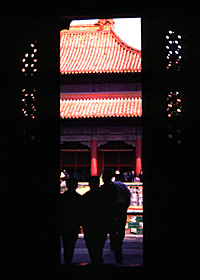TEN YEARS ON
While the world still fixates on tanks in Tiananmen and embassy bombings in Belgrade, in bustling Beijing, citizens and cadres alike are far too busy building a modern China to dwell on the "T" word
By Ron Gluckman/Beijing
I
'M STANDING DEAD CENTER of the People's Republic, or as close as one can get to the communist core.I'm outside the Gate of Heavenly Peace, where a half-century ago Chairman Mao Zedong launched Red China. At least that's what we called the place when I was growing up in America.
For a long time, though, it's been the People's Republic. In some ways, it is still red, especially at the Chairman's palace in the middle of People's Square. Go there on an average day and the People's people mob the place. Two by two, they storm up the steps, into Mao's mausoleum.
Inside, the Great Helmsman's body lies like the Party's crown jewel on a red cushion in a huge glass case - glowing red in the velvet light. Mao is in an eternal sleep, blissfully unaware that once again foreign barbarians are bad-mouthing the nation he invented.
Having heard quite a lot of that myself lately, I am in Beijing to take the pulse during a year of poignant anniversaries.
 Not far from Mao's mausoleum is the People's Scoreboard. In blazing red, blinking LED
lights, it declares that there are less than 24 million seconds till the end of the
millennium - and some of the biggest people's parties People's Square has seen.
Not far from Mao's mausoleum is the People's Scoreboard. In blazing red, blinking LED
lights, it declares that there are less than 24 million seconds till the end of the
millennium - and some of the biggest people's parties People's Square has seen.
This same gaudy clock counted down Hong Kong's return to China. Now, it is reset to record the score on Dec. 20, when the tiny Portuguese colony of Macau, just across the Pearl River Delta from Hong Kong, likewise returns to the motherland.
Macau is the West's first and final outpost in the Far East, yet its recovery is notably underwhelming. The miniscule 450-year-old European enclave in southern China will add little mass to one of the world's largest and most powerful countries. Still, in this banner year of big anniversaries - the 50th of the People's Republic on October 1 among them - Beijing is beaming about even the dullest red-letter days, all the while side-stepping more troublesome dates.
There are plenty of those, too. We've already seen the 40th anniversary of the Tibet uprising that led to the Dalai Lama's long and unresolved exile and the 20th anniversary of the Democracy Wall Movement, which started not far from where I stand. But the biggest date of all will be marked when the clock ticks down to Day 199 - only don't expect any parties from the Party. That's June 4, one anniversary China would just as soon forget - if only the world would let it. Ten years ago, tanks rolled into People's Square, which became forever a name of infamy - Tiananmen.
Certainly Tiananmen doesn't look much like "the world's stage" it was once dubbed. More like the world's largest construction zone. Tiananmen is completely sealed off behind a two-meter blue fence. Walkways are being ripped apart, trenches dug. In imperial times the emperor passed this way, from his Forbidden City through the same Gate of Heavenly Peace pictured upon the red seal of every People's Republic emblem, to annual prayers at the Temple of Heaven.
 Now, cranes and trucks rule the site. Workers
scurry around in hard hats, through a pale cloud of construction dust filling the plaza.
The Monument to the People's Heroes is encased in bamboo scaffolding and green netting,
looking like a Christo piece, Jolly Green Obelisk.
Now, cranes and trucks rule the site. Workers
scurry around in hard hats, through a pale cloud of construction dust filling the plaza.
The Monument to the People's Heroes is encased in bamboo scaffolding and green netting,
looking like a Christo piece, Jolly Green Obelisk.
Cranes and Red Army troops guard each entrance and discourage crowds. The authorities are understandably jittery. A few weeks ago, thousands of followers of the Falungong cult staged a silent protest right outside the leadership compound.
Then, earlier this month, a U.S. missile strike on China's embassy in Belgrade set off perhaps the most vociferous anti-foreign protests since the Boxer Rebellion.
Beijing has banned any form of gathering around the square, which, in any case, will remain closed June 4 as refurbishment continues for the Oct. 1 party, when half a million people are expected to throng Tiananmen.
At over 100 acres, the square is largest in the world, reportedly with room for a million people - provided they aren't carrying protest signs. The closure's timing has prompted renewed bad press. Western journalists are as Tiananmen-obsessed as any cadre.
Nobody need dispatch correspondents to compile the predictable pieces that will soon be flooding periodicals. They will be penned by old China hands, lodged at the Mandarin Hotel in Hong Kong, where they will meet former dissidents to discuss the dreadful circumstances in China. Where none of them have been for 10 years.
Cliched? As much as the Cold War concept of Red China that was force-fed to me long ago. More than time has passed since Tiananmen. Yesterday's radicals have grown up, gone into exile or business.
For an alternative take on Tiananmen, taxi half an hour northwest of the square. Clothing boutiques, music shops and Game Boy stalls line the streets around a cluster of universities in Haidian. Earlier this month, students were busy protesting outside NATO embassies.
Normally they congregate in the Hopeful Cafe and Stranger Bar. They slurp noodles beneath pictures of American football teams and talk cars, clothes, music, movies, relationships - like college kids anywhere. Tiananmen may be flavor-of-the-month around the globe. But not here.
"We want democracy, but not like Tiananmen," says one student. "We want change with order. Tiananmen was important, but everyone says it was a mistake. Change should come from reform, not protest." The buzzword among college students these days is economy, not democracy. Jobs are what they worry about.
Unlike the Beijing leadership and foreign media, today's students aren't locked in a Tiananmen time capsule. With good reason. They are far better informed than a decade ago. Censorship has loosened, spawning a slew of spirited publications across China. In Haidian, Internet cafes proliferate. Online time costs under 25 cents for 10 minutes. Inside, I check the reliability of widely printed accounts that document strict Internet control.
Service is fast and I easily access various human-rights sites. Some are blocked, but students steer me to overseas pathways that circumvent the state's feeble attempt to filter information. Not that many students themselves bother. They are too busy exchanging e-mails about business opportunities, surfing sites displaying PC prices or downloading Spice Girls clips.
China is currently attempting a Great Leap Online. With 1.2 billion people, it boasts only 2.1 million Internet users - half a million of them in Beijing. By another measure, there are just 1.6 Internet hosts per 100,000 people - one-hundredth the rate in Malaysia, and less than a third that of Indonesia.
China has tackled this shortcoming in novel ways. Eighteen months ago, Beijing Telecom launched Capital Online. Customers dial 2631, type 263 for user and password, and, viola, instant access. No forms, no sign-up stigma, no server. Perhaps the freest connection anywhere.
Not that China will get much credit in the West. For this, or more sublime
achievements. Like talking. That's the rage these days. Hop in a cab and the driver
immediately launches into a tirade. Politics, rules and reforms; no topic is off-limits.
In street stalls, too, people are talking. Loud, spunky, outspoken. Non-stop. A few years
ago, silence was golden, and the walls had ears. Among the most popular programs on
television these days is Say What You Think. Television crews roam the streets and
urge people to do just that. 
And check out the music. Not so long ago the nation's repertoire was regime-limited to a handful of classical movements and one opera. Now punk bands rage at Scream Club near Peking University.
"The younger generation is much more sophisticated than 10 years ago," says Cui Jian, the fabled rock star who rose to Springsteen-like glory during the heady days of Tiananmen, a decade ago. He adds: "They have different tastes. Things are freer. They are exposed to way more influences than we ever knew."
But are free tunes and free thinking the same, I wonder? Just how far has Beijing really come in the 10 years since Tiananmen? It's time to tap two sources from opposite ends of the political spectrum - a senior Party official and a Tiananmen radical.
The first session takes place in a five-star hotel, where we exchange stiff greetings before moving upstairs to a pretentious restaurant. There, I have my worst (and priciest) Beijing meal. And talk about a stilted conversation. I ask questions through a translator and receive for my pains a stream of self-righteous dogma.
My next interviewee is quite a contrast. He suggests an eatery that serves cuisine from Xinjiang, the northwestern Muslim region battling for autonomy. We're quaffing beers, listening to lively Turkic music, while my source rails about the system. "The Communist Party is totally corrupt!" he shouts. "Even they know it. Corruption is our worst problem. But they can do nothing about [it]." He's outspoken, eloquent and only slightly drunk. The Tiananmen radical, right? Wrong: He's the ranking Communist official.
 In contrast, Ren Wanding, the dissident, seems trapped in time. Ren is dressed in a
green sweater and brown, leather coat. Wearing a neat goatee any radical would love.
"The rights problem hasn't changed much in China in the last 10 years," he says
severely.
In contrast, Ren Wanding, the dissident, seems trapped in time. Ren is dressed in a
green sweater and brown, leather coat. Wearing a neat goatee any radical would love.
"The rights problem hasn't changed much in China in the last 10 years," he says
severely.
And reforms? Shams to fool the West. Hmm. Something doesn't add up here. But never mind, because Ren's credentials are impeccable: a total of 11 years in prison.
He begins his discourse with a rant about his more famous overseas colleagues - the ones in New York who spend more time bickering among themselves than getting things done. Ren spent seven years in prison for his part at Tiananmen, and four more in jail after the Democracy Wall Movement a decade before.
Some Beijing correspondents consider him the top-ranking dissident in China. Yet hardly anyone pays him attention anymore - unless a Western reporter needs a quote about Amnesty International's annual human-rights roundup.
"I'm not allowed to meet journalists, but I do anyway." Then he adds: "Things have become a bit more relaxed." He can say that again.
Two nights later I'm with my new Party pal. "The dissidents have been bad for China," he says. "Look at them. They aren't good politicians. None of them. Some are clever and good thinkers, but the best went abroad." This really bugs him.
"China must come up with new ideas, new approaches. The government knows this, but where will we find the new thinkers? Where will we find individuals who know how to think for themselves? After all these years in this system, how are we ever going to come up with a China Bill Gates?"
Then he orders more beer and quizzes me relentlessly about America. Not casual, but probing, questions. He wants to dissect how decisions are made in the U.S political system, as if I have a pipeline to Clinton. Even over drinks, he is no nine-five Commie.
He's part of a team of advisers reshaping China into a future powerhouse. He looks at politics the same way the Japanese did the electronics industry after the war, or the Koreans shipyards. Take them apart, copy and reassemble.
"It's a big problem," he adds solemnly. "We want to be opening up, but want to see something new develop. We don't want communism. That's over. But we don't want capitalism either. We see how it has developed in America and see the problems with that. We don't want that model. We want something new."
Perhaps the Party is right to look ahead - not back. And to challenge the nay-sayers. After all, what nation on earth has moved forward so fast in the last decade.
Still, the world's attention remains riveted on Tiananmen. Even the People's people have their own misgivings. Singer Cui Jian, who recorded Get Over That Day, tells me: "Tiananmen is still so sensitive, even after 10 years. People are making so much money, you might not think it's important anymore. But some people have deep pain. Some people will remember forever."
My Party pal is surprisingly flexible on most subjects, but not this one. "China won't apologize for Tiananmen. Not now. Maybe not ever. It's certainly too early now."
So, the ghosts continue to roam the square, where a clock ticks off Red China glories as the Gate of Heavenly Peace overlooks a scene that is anything but peaceful. Construction chaos fills Tiananmen as its only resident, Mao, commutes to work each day.
His body moves by conveyor from earthquake-proof chamber to the viewing stand at 8 a.m., then back inside by noon. Mao reportedly received a new nose recently, and soon his square will have a new floor. Plus greenery. There also will be period street lamps glowing on boulevards leading to Mao's house, as Beijing restores the area to its 1949-era glory for the 50th anniversary party on Oct.1.
Where it goes from there is anyone's guess. But some time before midnight, in secret, a new portrait of Mao will be hung from the Gate of Heavenly Peace. This much is certain: The Chairman will look over People's Square in fresh shades of Red radiance, but the China he sees before him, he will not recognize.
Ron Gluckman is an American reporter who has been based in Hong Kong since 1990, when he began visiting China for a wide variety of publications, such as the newsweekly Asiaweek Magazine, which ran this story in May 1999.
Ron subsequently moved to Beijing, where he spent five years as a correspondent, from 2000-2004.
Since 2005, he has been based in Bangkok, and since mid-2005, divides his time between Bangkok and Phnom Penh, Cambodia, when not on the road.
All photos by Ron Gluckman. Bottom two were shot for this story in 1999. The snowfall was the first weekend of Jan 2001 --- a rare feathery powder fell in the capital. It was too beautiful not to share with you!
Oh, and all pictures are of the Forbidden City, which faces Tiananmen.
To return to the opening page and index
push here
[right.htm]
